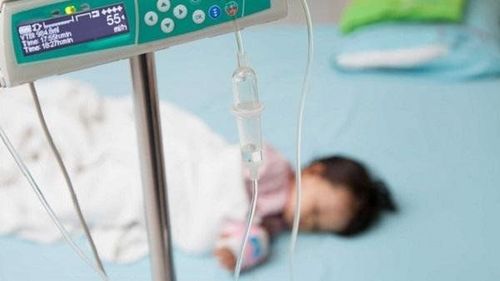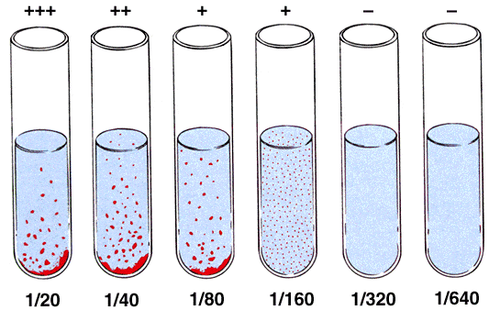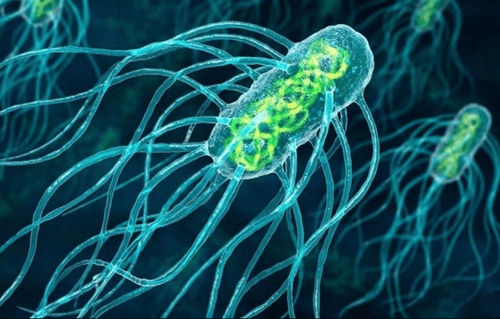This is an automatically translated article.
Bacterial diseases are always dangerous for us because the agent is difficult to detect with the eyes. In particular, Salmonella is a bacteria with high infectivity, leaving unpredictable consequences.
1. What is salmonella?
Salmonella is a bacteria that can make you sick. In the United States, Salmonella infects about 1.35 million people each year. Salmonella has a more severe impact on people who are elderly, young or already sick. The disease sends thousands of people to the hospital each year, sometimes life-threatening.
Salmonella does not make everyone sick. Children under the age of 5 are most likely to develop the condition, and about a third of cases occur in children 4 years of age and younger. Babies who are not breastfed are more likely to get this disease. Certain medications that reduce stomach acid can also increase the chance of an infection.
2. Source of Salmonella infection
You usually get salmonella from eating or drinking something that has bacteria in it. Salmonella is more common in animal foods, like eggs, beef, and poultry. But soil or water can also contaminate fruits and vegetables. In addition, Salmonella can be transmitted from food to food by hands or knives, cutting boards, plates, and other kitchen utensils. Not only that, you can get an infection if you don't cook certain foods well enough.
In fact, salmonella bacteria live in the intestines of some animals, especially:
Birds, such as chickens and turkeys; Amphibians, such as frogs, toads, and salamanders; Reptiles, such as snakes, lizards, and turtles. If the feces of these animals get on your hands, you can infect yourself or others. In addition, human feces can also transmit disease. That's why it's so important to wash your hands after you go to the bathroom.
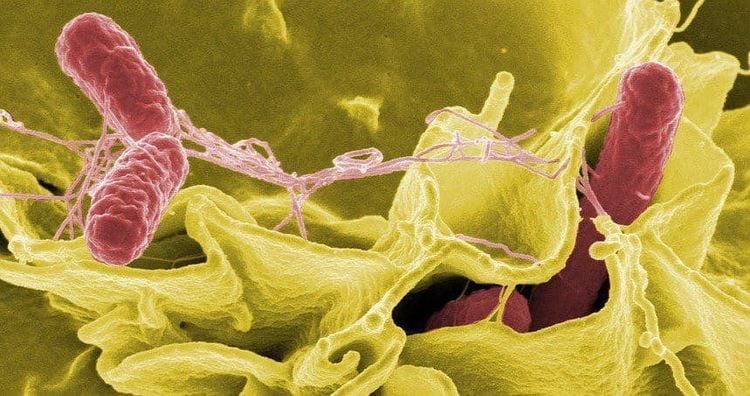
Salmonella có tác động nghiêm trọng hơn đối với những người già
3. Symptoms of salmonella infection
If infected with salmonella, you often have diarrhea, fever and stomach cramps. You may also experience headaches, nausea, and vomiting. Symptoms usually begin 6 hours to 6 days after infection and last 4-7 days. You usually feel better in about a week, although it may take several months for your bowel movements to return to normal. Sometimes the infection spreads to your blood, bones, joints, brain, or nervous system and causes long-term symptoms that affect those organs.
Contact your doctor if you notice any of the following:
Blood in the stool; Diarrhea accompanied by fever over 39 degrees C; Diarrhea does not improve after 3 days; signs of dehydration such as dry mouth, low urine output, and feeling dizzy when you stand; Vomit a lot. However, many types of germs and diseases can cause typical symptoms of salmonella infection. To confirm you have this disease, your doctor will send a sample of your bowel fluid to a lab. Then, testing techniques will be applied to check for the presence of salmonella. If you are very ill, your doctor may order additional tests to determine the exact type of salmonella bacteria.
4. What should you do if you have salmonella?
If you still feel good, you should regularly drink plenty of water and rest to fully recover within 1 week. But if the diarrhea is too severe, you may need to go to the hospital for intravenous fluids and other treatments. You may need to call your doctor to rule out other problems if you have multiple symptoms and you're not sure that salmonella is the cause.
Also, although salmonella is caused by bacteria, antibiotics don't make recovery faster unless your immune system is weak or the infection has entered your bloodstream. In many cases, treatment with antibiotics can prolong the time you have a bacterial infection and increase your chances of getting sick again from the same infection.
Babies or young children are more likely to have serious health problems from salmonella. You are also more likely to have complications if:
You have an immune problem caused by an illness (such as HIV ); Take medicine that weakens your immune system; sickle cell disease ; Take medicine to control stomach acid; There is a problem with the spleen. In these cases, your doctor may recommend antibiotics to help prevent the most serious complications.
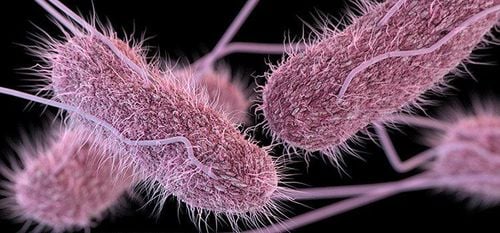
Vi khuẩn salmonella có thể gây tiêu chảy, sốt và co thắt dạ dày
5. How to prevent salmonella infection?
To limit the spread of salmonella from external agents, you should wash your hands after playing with animals. Children under the age of 5 should not touch animals that can carry salmonella, such as turtles, frogs, chickens, or lizards. Do not eat or drink around these animals or their habitats. Take your pet to the vet for regular checkups.
You should follow these tips to reduce your odds of getting salmonella from food:
Do not eat undercooked eggs, meat or poultry; Keep undercooked meat away from prepared foods; Thoroughly wash all kitchen surfaces, knives and other utensils after use; Store food immediately in the refrigerator or freezer for 1-2 hours, even if the food is freshly prepared. In a nutshell, Salmonella is a bacteria that can cause illness in the human gastrointestinal tract. Although rare, the harmful effects of salmonella can be transmitted from the intestines to the bloodstream and to other places in the body. Therefore, to prevent Salmonella bacteria from causing illness, people need to maintain hygiene around the places where they live and work.
Please dial HOTLINE for more information or register for an appointment HERE. Download MyVinmec app to make appointments faster and to manage your bookings easily.
Reference source: webmd.com




